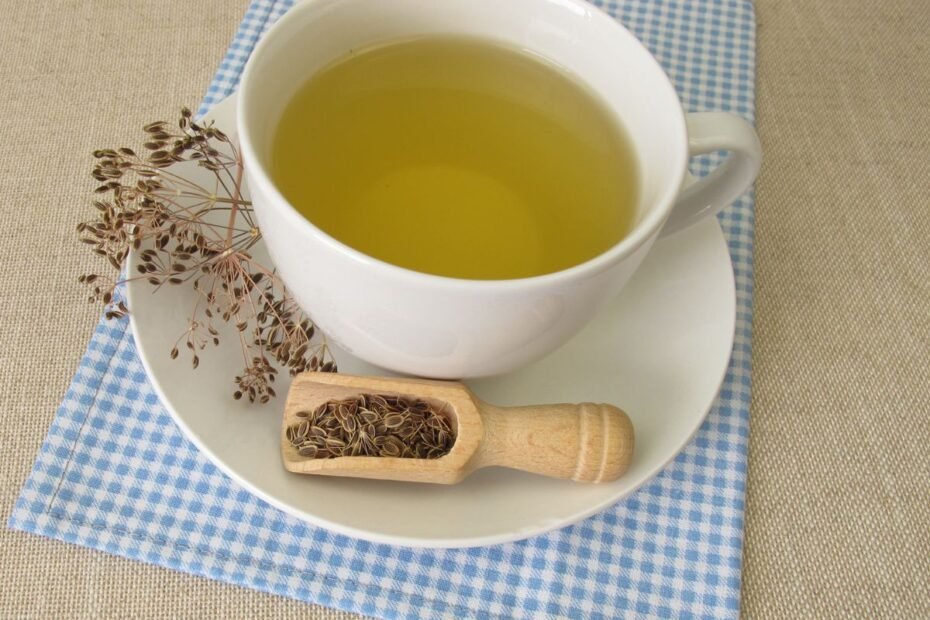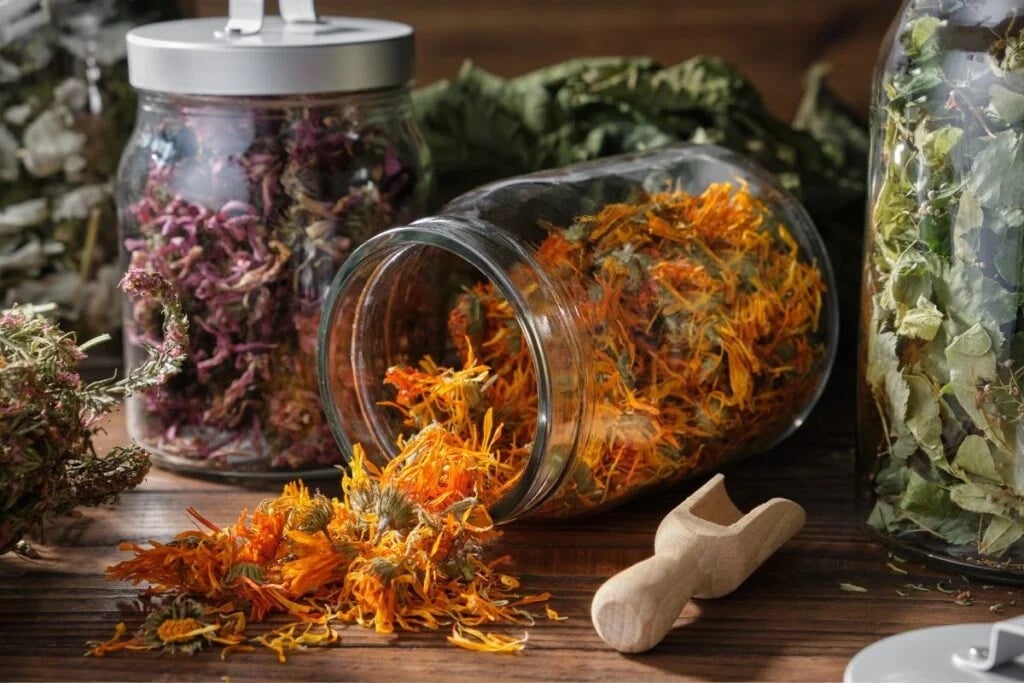Dill (Anethum) belongs to the celery (Apiaceae) plant family. They originate from the Mediterranean coast but have been found in many countries with different climates since ancient times. There are three species in the dill genus, but one of them, the dill (Anethum graveolens), grows worldwide. People eat dill leaves fresh, frozen, or dried. They also use the whole mature dill plant for marinades. Fresh dill leaves and seeds are used for medicinal purposes, and one of them is dill tea. Let’s find out dill tea benefits.
People know dill as an annual herbaceous plant. Its stem grows up to more than 1 meter high. The leaves are feathery, more like spines, and grow from a single leaflet. The flowers are umbellate, formed at the apex of the stem, and yellow— it blooms from July to September. From August to October, the seeds ripen in the inflorescences.
You can grow dill in the greenhouse and garden from early spring until the first frost. During this period, sow them every two weeks to ensure fresh raw material is always available. Fresh leaves can be frozen or dried. Dill seeds can be collected in the autumn. You can store dills in a breathable container in a dry, dark, place and consume them throughout the year.
However, if you do not have the opportunity to grow dill, buy them in many different forms (fresh, seeds, essential oil) in many supermarkets.
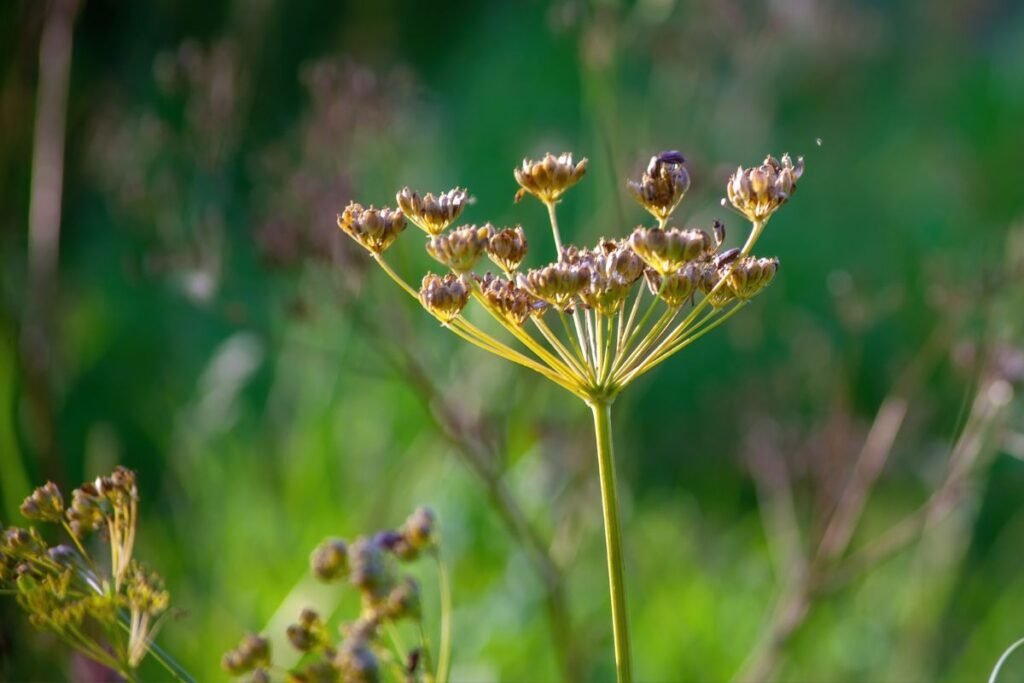
Dill Tea Benefits The Body
Dill tea has been a folk remedy for various ailments since ancient times. Modern science has also confirmed many of the beneficial properties of dill.
The leaves and seeds of dill are rich in beneficial substances. These include essential oils, antioxidants, proteins, minerals (zinc, phosphorus, iron, calcium, potassium, sodium, manganese, magnesium, and copper), and vitamins (C, B, and P). Surprisingly, dill contains twice as much vitamin C as lemons or oranges. Dill seeds are rich in different essential oils. Dill seeds and dried dill leaves are mainly used for medicinal purposes.
What Are The Healing Properties and The Benefits of Dill Tea?
In folk medicine, dill improves intestinal function during colic, flatulence, and diarrhea. It treats kidney stones and bladder inflammation. Dill tea has also been used for coughs and bronchitis; it lowers blood pressure and is a preventive measure for gallstones. Dill tea also helps with insomnia and neurological headaches. For heart failure and angina, folk medicine advises eating fresh dill leaves.
Traditional medicine recognizes the following medicinal benefits of dill tea:
- The iron and manganese in dill (and other minerals) affect brain and nervous system function. These substances also regulate blood sugar levels.
- Calcium, magnesium, and phosphorus in dill support bone health.
- The antioxidants, flavonoids, tannins, and terpenoids in dill fight free radicals and prevent chronic cardiovascular disease and the proliferation of cancer cells.
- The essential oil monoterpenes in dill have anti-cancer, antibacterial, antiviral, and anti-inflammatory properties.
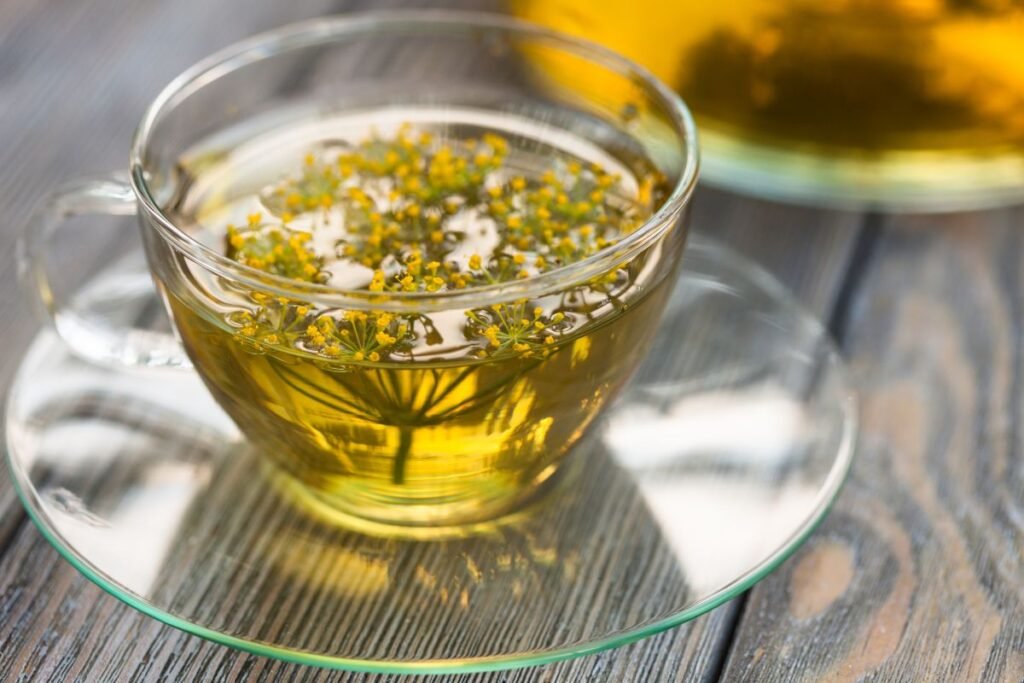
Dill Tea Benefits: for The Prevention of Disease and Treatment of Ailments
Dill tea, made from leaves or seeds, is more commonly used as a medicinal drink. It often helps with indigestion, high blood pressure, expectoration, etc. However, a cup of this tea can also satisfy your enjoyment. Let’s avoid various ailments by spicing up your diet with this tea.
Dill tea has a mild yellowish color, a slightly sweetish taste, and a lemony aftertaste. However, you may sweeten the tea with honey or a slice of lemon. Dill tea is also a beneficial accompaniment to a light snack such as cottage cheese. This tea is simple to prepare. Dill seeds or dill leaves can be used, either fresh or dried.
Dill Seed Tea
For the tea, you will need:
- 1-2 teaspoons of dill seeds
- 1-2 cups of water
In a teapot, cover the dill seeds with heated water. Close the container and leave it to steep for 5–10 minutes. Then, strain and drink.
Dill Leaf Tea
For the tea, you will need:
- 1 handful of fresh or 1 tablespoon of dried dill leaves
- 1 cup of water
Add the dill to the cup, pour the boiling water, cover, and steep for about 5 minutes: strain and drink.
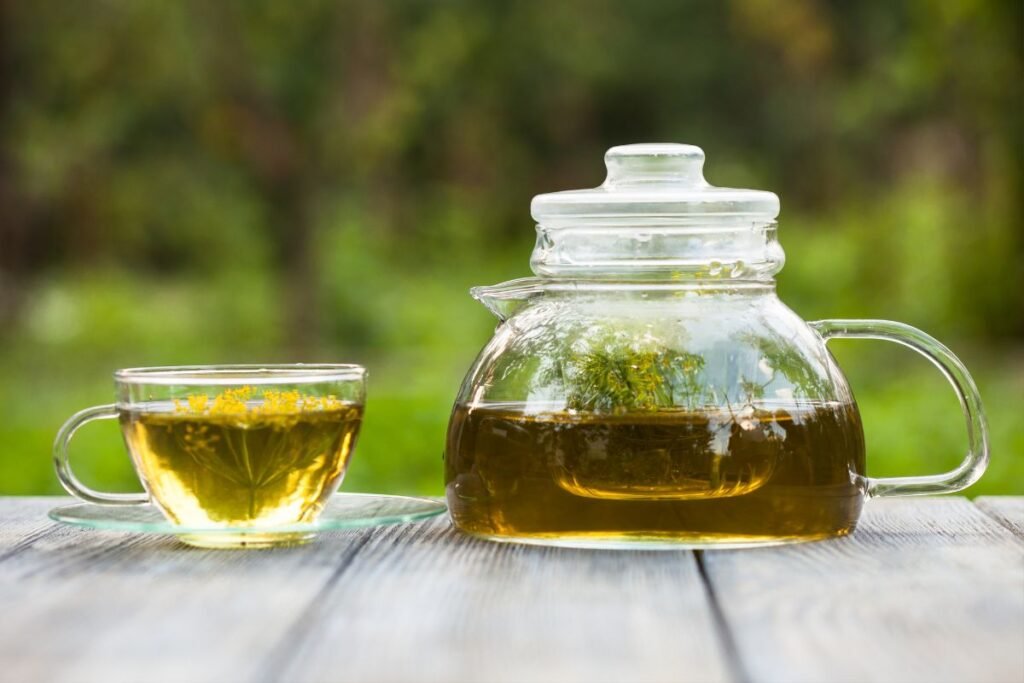
Dill Infusions for Healing
For the treatment of cardiovascular diseases
Pour a tablespoon of dill seeds over a cup of boiling water, cover, and leave for 15 minutes. Divide a glass of the tincture into three doses and drink it daily.
Hypertension or high blood pressure treatment
Use 1 tablespoon of the herb mixture from equal parts of dill seeds, crushed valerian root, and comfrey. Pour a cup of boiling water over the mixture, cover, and leave to stand for about 30 minutes. Strain the infusion, divide it into three doses, and drink it throughout the day.
To relieve bloating, stimulate appetite, and improve digestion
Pour 1 tablespoon of dill seeds over a cup of boiling water, cover, and leave to stand for 15-20 minutes. Strain the infusion and drink 1 tablespoon 3-6 times before meals.
Other Dill Tea Treatment Options
For kidney stones, inflammation, and cystitis
1 tablespoon of dill seeds is poured over 0.5 liters of boiling water, covered, and left to stand for 20 minutes. Strain the infusion and drink half a glass before meals 3–5 times.
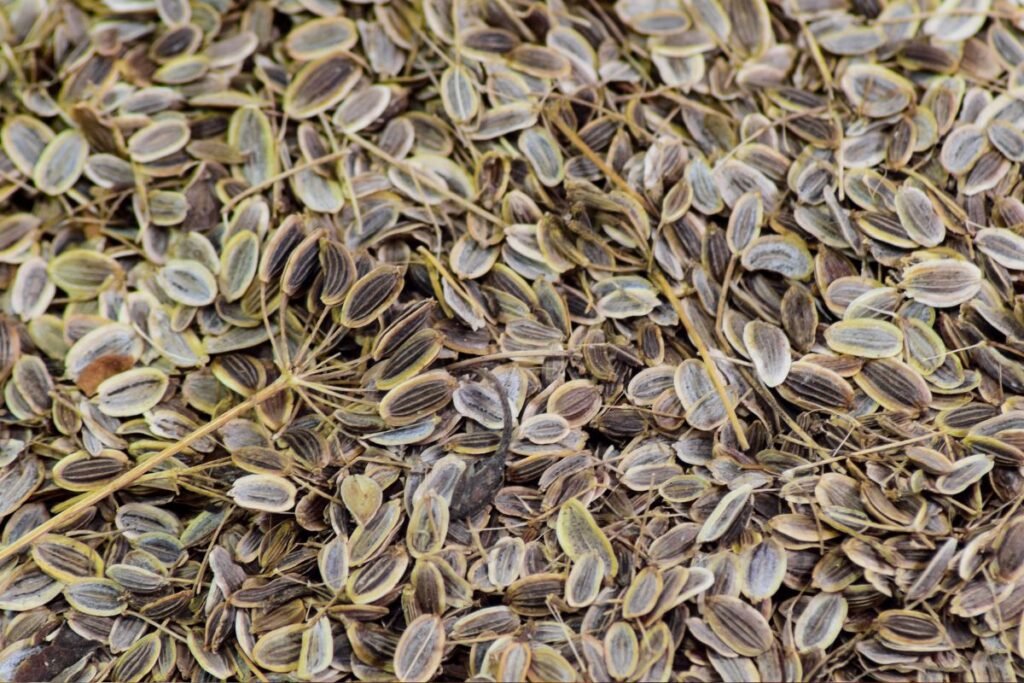
For the treatment of urinary incontinence
Put 1 tablespoon of dill seeds in a cup of boiling water. Close the container tightly and place it in a warm place to stand for 2–3 hours. Strain the infusion and drink it immediately. Drink the infusion for at least a week to achieve a curative effect.
For improving cerebral blood circulation
Pour 0.5 l of red wine over 500 g of dill seeds. Set low heat and cook for 5–10 minutes, then strain. Store dill decoction in an airtight container in the fridge. Take 1 tablespoon at bedtime.
For the treatment of gallstones
2 tablespoons of dill seeds are added to 2 cups of boiling water and boiled over low heat for about 15 minutes. Remove the decoction from the heat and strain. Drink this decoction four times a day, half a glass each. The course of treatment is 10–14 days. Then, take a break of 2 weeks, and repeat the treatment.
For the treatment of periodontal disease
1 tbsp. dill seeds are added to a cup of boiling water and boiled for about 10 minutes. This decoction can be made from fresh dill leaves in the summer. Rinse your mouth at least two times with the decoction after it has been strained and cooled.
Dill Water: Another Way to Maintain Health
Dill water has healing properties, like dill tea, decoctions, and infusions. Drink it when you have a dry cough, indigestion, constipation, bloating, or intestinal distress.
For the preparation of the dill water, you will need:
- a few drops of dill essential oil
- a glass of boiled water
Add dill essential oil to the boiled and cooled water, and stir well. Drink a teaspoonful or tablespoonful of this water 3-6 times after meals.
Dill Tea and Compress for Skin Beauty
Dill has a brightening effect on the skin. Compresses made from dill seed tincture can treat skin inflammation and cleanse problematic, acne-prone skin. Dill preparations are suitable for both oily and dry skin. You can also make dill remedies at home.
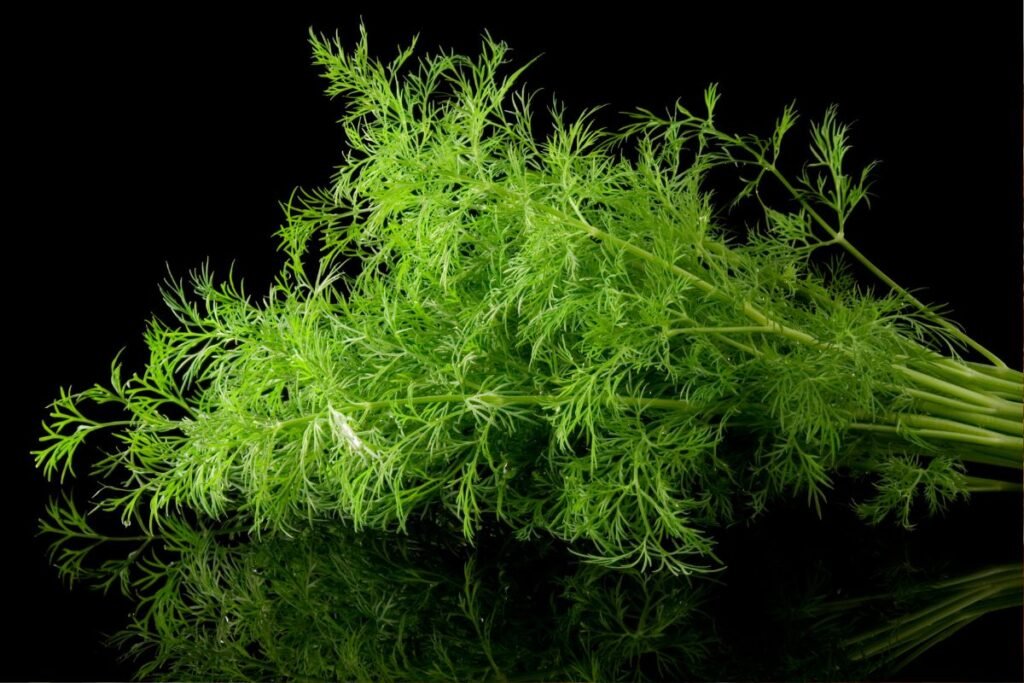
Dill Mask for Oily Skin
- 1 tbsp. fresh, chopped dill leaves
- one tbsp. grated apple
- 1 tbsp. natural yogurt
Mix all the ingredients and then apply the mixture thoroughly to your face. Leave the mask on the skin for 30 minutes, then rinse with cold water.
Dill Mask for Dry Skin
- 1 tablespoon chopped fresh dill leaves
- egg yolk
- 1 teaspoon of oil (olive, almond, etc.)
Mix all the ingredients and apply them thoroughly to your face. Leave the mask on the skin for 30 minutes, then rinse with warm water.
Moisturizing Dill Mask
- 1 tbsp. dill juice
- 1 tbsp. milk
- 2 tsp. grated cucumber pulp
Mix all the ingredients and apply them thoroughly to the face. Leave the mask for 15 minutes, then rinse with warm water.
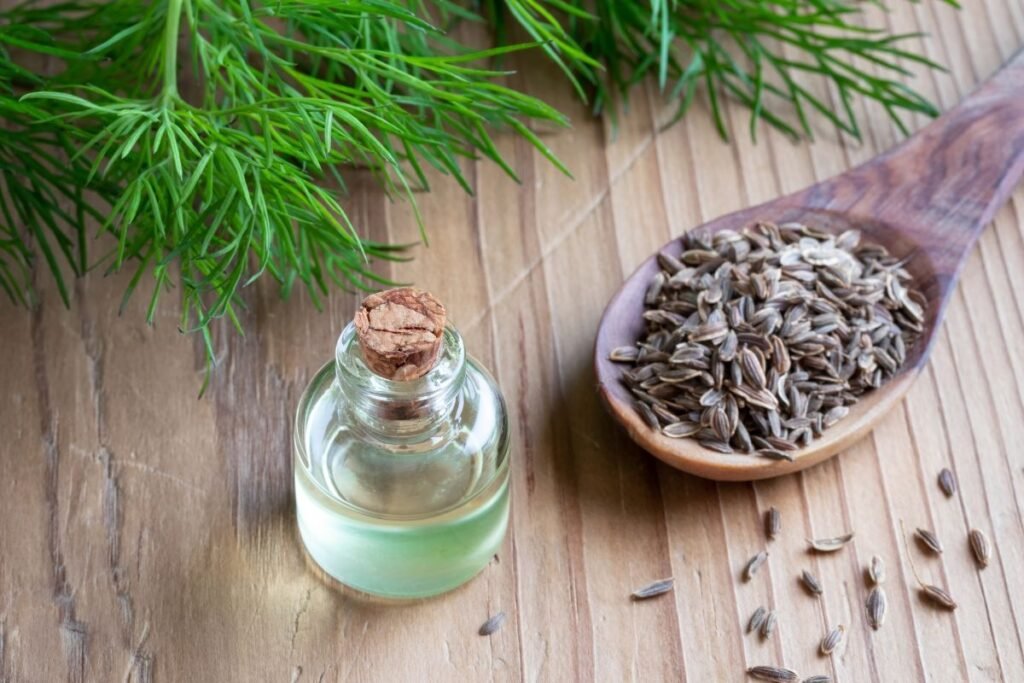
Dill Mask for The Red Acne Treatment
- 1 tbsp. fresh, chopped dill
- 1 egg white
Mix the ingredients until smooth. The prepared mask is applied to the face and kept for 20 minutes. Then wash off with warm water. The course of treatment is repeated 10-15 times, with the procedure repeated 2-3 times a week.
You can also moisturize the skin tormented by red acne with compresses of dill seed decoction. Keep the moistened cotton cloth on the face for 20 minutes. The recommended duration of the treatment course is 30 days, with the procedure being carried out every other day.
Dill Tea Benefits for Women and Babies
Dill infusion or dill water stimulates the secretion of mammary glands. This helps to increase milk production for breastfeeding women.
Studies have confirmed that dill tea can help reduce menstrual pain.
Dill tea benefits babies by reducing colic.
Side Effects of Dill Tea
Dill is a safe product to consume, and side effects are extremely rare. They can cause allergic reactions such as diarrhea, vomiting, itching of the mouth, or throat swelling. People allergic to anise, cumin, or celery are at higher risk of such reactions. If you have such allergies, it is better to avoid dill tea.
You should also consult your doctor if you have low blood pressure, renal pelvis inflammation, or circulatory insufficiency. Dill tea can have a dangerous uterine-stimulating effect on pregnant women.
It is better not to drink dill tea if you are taking blood thinners. Dill tea may overstimulate the action of these drugs. It can also adversely affect the action of antibiotics.
Sources:
- https://www.healthline.com/nutrition/dill
- https://draxe.com/nutrition/dill-weed/
- https://www.narayanahealth.org/blog/health-benefits-of-dill/
- https://minikar.ru/en/vdohnovenie/ukrop-otbelivaet-kozhu–poleznye-svoistva-ukropa-v-domashnei/
- https://teatrivia.com/how-to-make-dill-tea/
Associative photos from © Canva.
